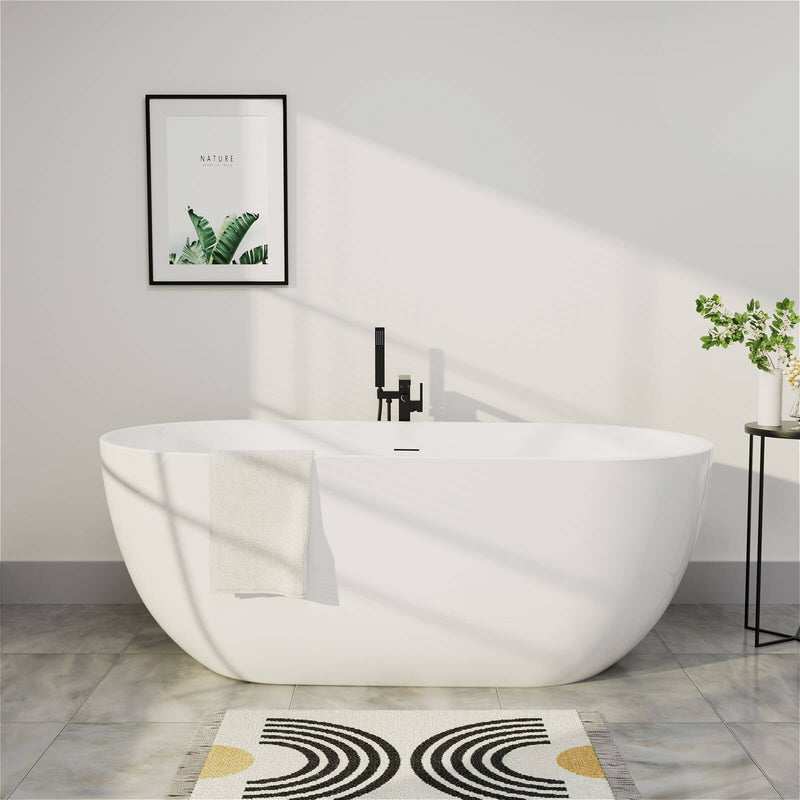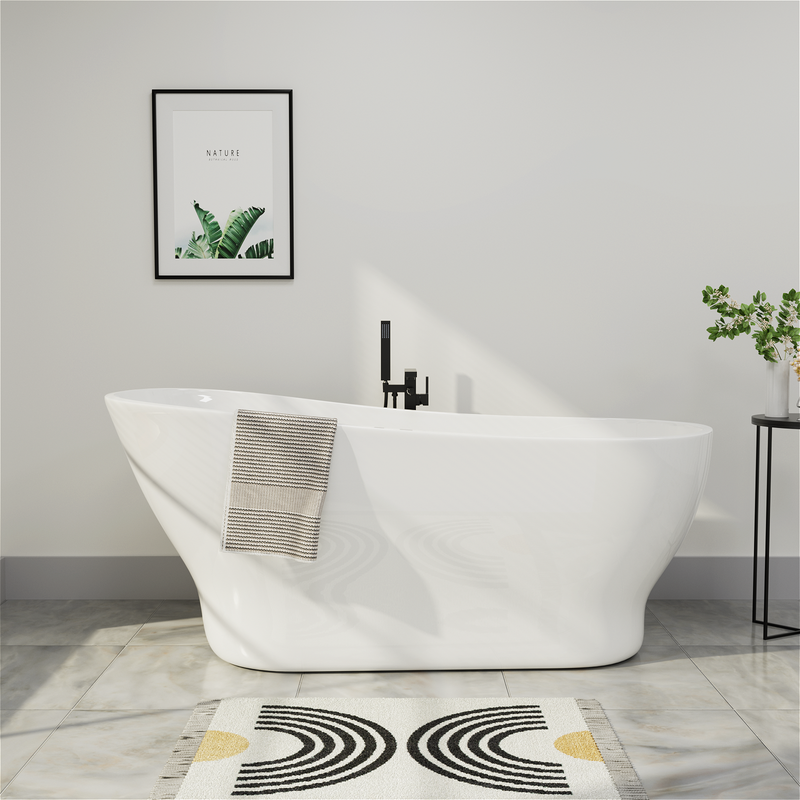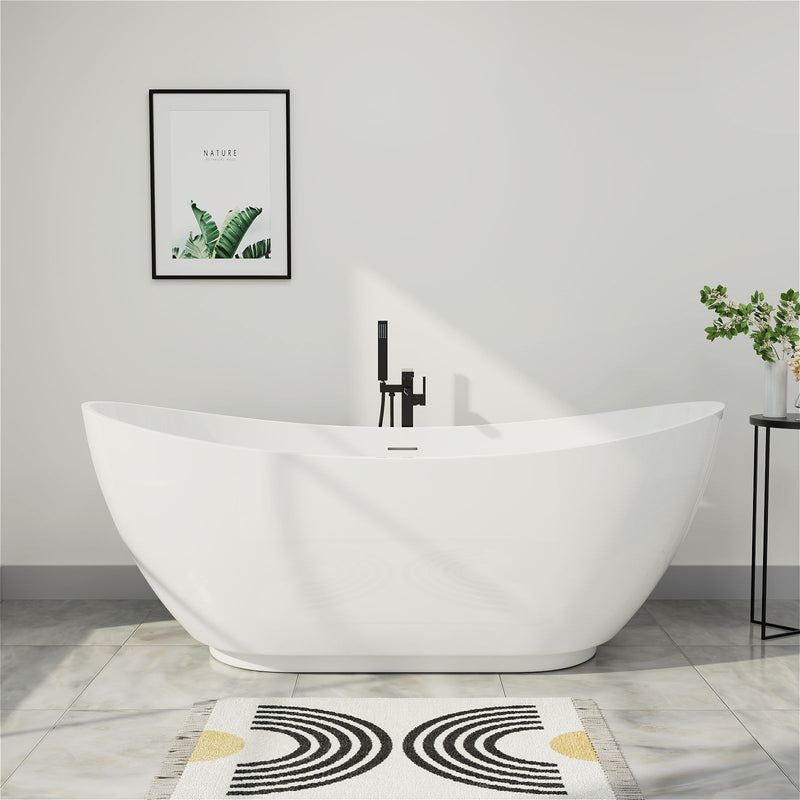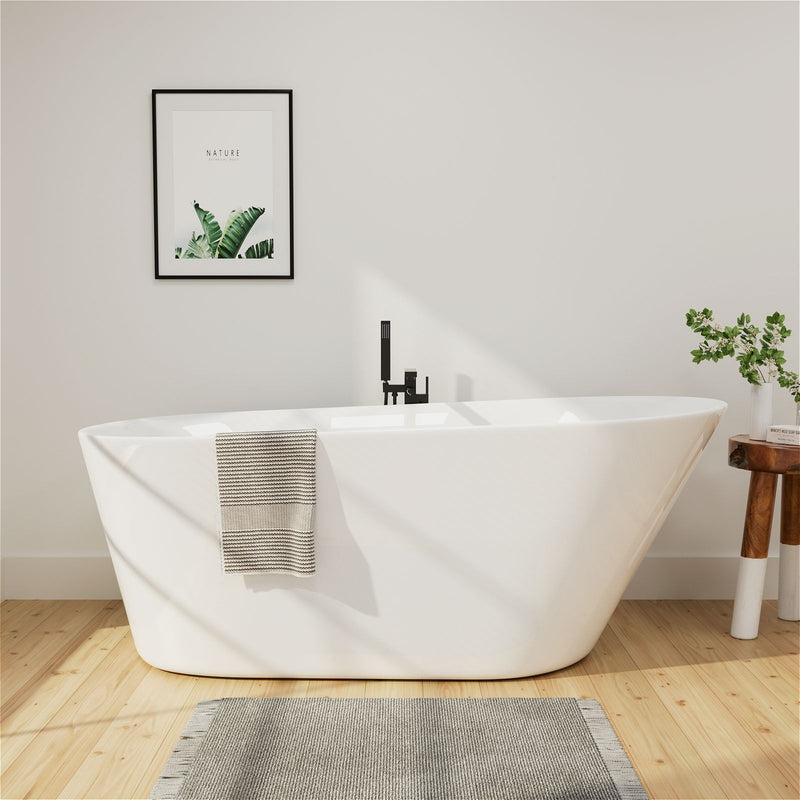For millions of homeowners across vast swathes of the United States - from the sun-baked Southwest to the mineral-rich Midwest and Northeast - hard water isn't just an inconvenience; it's a relentless battle fought daily in the bathroom. That stubborn, chalky white residue (limescale) and unsightly soap scum clinging to shower surfaces are more than just eyesores. They degrade the beauty of your sanctuary, demand constant scrubbing, and can ultimately shorten the lifespan of your fixtures. Nowhere is this battle more critical than on the very floor of your shower: the shower base. Choosing the right material here is paramount for long-term beauty, hygiene, and sanity. This guide dives deep into the world of shower base materials, specifically evaluating their ability to withstand the unique challenges posed by America's hard water zones, helping you select a surface that stays cleaner, longer, with less backbreaking effort.
Understanding the Enemy: Hard Water and Its Impact on Shower Bases
The Chemistry of Hard Water Havoc
Hard water contains high concentrations of dissolved minerals, primarily calcium and magnesium carbonates. When this water evaporates or dries on your shower base after use, these minerals are left behind, forming the visible, crusty deposits known as limescale. Simultaneously, the minerals interact with soap and body oils, creating a sticky, filmy residue known as soap scum. This combination is notoriously difficult to remove and acts like a magnet for dirt and grime.
Why the Shower Base is Ground Zero
The shower base is constantly bombarded by water spray, sits wet for extended periods, and collects runoff laden with soap, shampoo, conditioner, and body oils. Its large, horizontal surface provides the perfect environment for hard water minerals and soap residues to settle, concentrate, and bond tenaciously. Unlike vertical walls that see more rinsing action, the base bears the brunt of the staining and buildup.

Consequences of Poor Material Choice
Selecting a shower base material ill-suited for hard water leads to a cascade of problems:
Persistent Staining: White scale deposits and dingy soap scum film become permanent fixtures, dulling the surface.
Increased Cleaning Frequency & Effort: You'll find yourself scrubbing far more often, often requiring harsh chemicals or abrasive tools that can damage the surface over time.
Surface Degradation: Porous materials can absorb minerals and residues, leading to etching (dull spots), discoloration, and a rough texture that actually attracts more buildup.
Hygiene Concerns: Buildup creates a breeding ground for mold, mildew, and bacteria in crevices or on textured surfaces.
Reduced Longevity: Constant harsh cleaning and mineral infiltration can weaken materials, leading to cracks, leaks, or the need for premature replacement.
The Contenders: Shower Base Materials Under the Hard Water Microscope
Not all shower base materials are created equal when facing down hard water. Let's dissect the most common options based on their inherent stain resistance, porosity, and ease of cleaning:
Solid Surface (Engineered Stone/Composite): The Premier Defender
Non-Porous Nature: This is the single most critical factor. High-quality solid surface materials are crafted to be completely non-porous throughout their entire thickness. This means calcium, magnesium, soap scum, and bacteria cannot penetrate below the surface. There's nothing for minerals to latch onto internally.
Seamless Integration: Solid surface bases are often fabricated as a single, seamless piece or with minimal, thermally welded seams. This eliminates the grout lines found in tiled bases, which are notorious traps for hard water scale and mildew. A smooth, continuous surface offers fewer places for gunk to hide.
Smooth & Dense Finish: The surface is typically polished to a very smooth, glass-like finish. This lack of texture prevents residue from mechanically adhering as strongly as it does to rougher surfaces. Water and cleaning solutions sheet off more easily.
Stain Resistance: Being non-porous and inert, high-quality solid surface materials are highly resistant to staining from hard water minerals, soaps, shampoos, and even many common household cleaners (though always check manufacturer recommendations). Limescale forms on the surface, not in it.
Cleanability: This is where solid surface truly shines against hard water. Because deposits sit on top of the impervious material, they are much easier to remove. Often, regular wiping with a squeegee after showering and periodic cleaning with mild, non-abrasive cleaners or specific hard water removers (like diluted vinegar solutions) are sufficient. Harsh scrubbing is rarely needed, preserving the finish.
Considerations: Premium solid surface bases represent a significant investment compared to basic acrylic. While highly durable, extremely heavy impacts could potentially cause damage. Ensure the product is specifically rated for shower base use and has a strong warranty. Quality varies, so research manufacturers known for integrity in their composite formulations.
Ceramic/Porcelain Tile (Over a Mortar Bed/Waterproof Base): The Classic Challenge
Tile Surface Resilience: The glazed surface of a quality porcelain tile is itself very hard, dense, and relatively non-porous. Glaze provides good initial resistance to water absorption and staining.
The Grout Achilles Heel: This is the fundamental weakness in the battle against hard water. Grout, the porous cementitious material filling the joints between tiles, is highly absorbent. It readily soaks up mineral-laden water and soap scum, leading to deep, stubborn staining, discoloration (often turning dark grey or yellow), and providing a perfect environment for mold and mildew growth. Cleaning grout lines in hard water areas is a constant, labor-intensive chore, and harsh cleaners can degrade the grout over time, making it more porous.
Texture Traps: While tile glaze is smooth, the inherent texture of the grout lines and any surface texture on the tile itself (e.g., matte, stone-look) creates micro-crevices where scale and scum can accumulate and become difficult to dislodge.
Maintenance Burden: Maintaining a tile shower base in hard water requires rigorous and frequent cleaning, specifically targeting the grout. Sealing the grout regularly (at least annually, often more) is essential to slow down absorption, but it's not a permanent fix and adds to the maintenance workload. Failure to maintain sealant allows hard water minerals to penetrate deeply.
Durability vs. Upkeep: While the tiles themselves are very durable, the grout system requires significant ongoing care to prevent deterioration and staining in hard water conditions.
Cultured Marble/Granite: A Potential Pitfall
Composite Nature: Made from crushed natural stone or quartz bound with polyester resins, these materials aim for a high-end look.
Porosity Concerns: The critical issue is porosity. Lower-quality cultured stone products can be surprisingly porous, especially if the resin content is insufficient or the manufacturing process is subpar. This porosity allows hard water minerals and soap scum to penetrate below the surface, causing deep-set stains and a permanent dulling or "cloudiness" known as etching. Once etched, the surface is ruined.
Gel Coat Vulnerability: Most cultured marble/granite bases rely on a thin, clear gel coat surface layer for shine and protection. This gel coat is easily scratched and can become dull or develop micro-cracks over time. These imperfections become focal points for hard water buildup and are difficult to polish out effectively. Harsh cleaners can damage this coating.
Stain Susceptibility: Without a truly impervious, non-porous structure like solid surface, and with a vulnerable gel coat, cultured stone is generally not recommended for severe hard water areas. It requires very gentle cleaning and risks permanent damage from mineral penetration and etching.
Acrylic: The Budget Contender - Proceed with Caution
Affordability & Versatility: Acrylic sheet formed over a fiberglass reinforcement substrate is the most common and affordable shower base type. It's lightweight, available in many shapes, and has decent thermal properties (feels warm).
Surface Vulnerabilities: Standard acrylic surfaces are softer and more prone to scratching than solid surface, tile, or enameled metals. While the surface itself is non-porous when new and unscratched, this is where the problem lies in hard water regions:
Scratches Harbor Buildup: Everyday cleaning, even with non-abrasive pads, can introduce fine scratches over time. These scratches become microscopic channels where hard water minerals and soap scum embed themselves, leading to visible greyish streaks and lines that are incredibly difficult to remove. Abrasive cleaners make this worse.
Potential for Staining: While generally stain-resistant, highly pigmented products (certain shampoos, hair dyes) or prolonged exposure to strong hard water deposits can sometimes cause surface staining on acrylic, especially if scratched.
Chemical Sensitivity: Some strong acidic cleaners (like undiluted vinegar or certain hard water removers) can potentially cloud or damage the acrylic surface if used improperly or too frequently.
Maintenance Reality: To keep an acrylic base looking decent in hard water, you must be vigilant about wiping it down (squeegee) after every use to prevent water spots and mineral deposits from drying on the surface. Regular cleaning with very mild, non-abrasive cleaners is essential. Even then, scratching and resultant buildup lines are common over time. Deep cleaning ingrained scale often requires products that risk damaging the finish.
Enameled Steel/Cast Iron: The Rare Shower Base Option
Extreme Surface Hardness: The porcelain enamel coating fused onto steel or cast iron is exceptionally hard, smooth, and non-porous. It offers outstanding resistance to scratching, chipping (under normal use), and staining - including hard water deposits and soap scum.
Easy Cleaning: Like solid surface, deposits sit on top and are relatively easy to clean off with non-abrasive cleaners. The surface can handle diluted vinegar solutions well.
The Significant Downsides:
Rarity & Cost: Enameled shower bases are far less common than other types and tend to be expensive.
Weight: Especially cast iron, which is extremely heavy, requiring reinforced floor structures and complicating installation.
Impact Vulnerability: While hard, the enamel coating can chip if struck very forcefully with a heavy, sharp object (like a large, dropped bottle), exposing the metal substrate underneath which will rust.
Limited Design Options: Styles and shapes are often more traditional or utilitarian compared to acrylic or solid surface.
Beyond the Material: Installation and Maintenance for Hard Water Resilience
Choosing a stain-resistant material is crucial, but proper installation and consistent maintenance are equally vital for long-term success against hard water:

Critical Installation Factors
Precise Slope & Drainage: The base must be installed with a perfectly consistent slope towards the drain. Any low spots or "birdbaths" where water pools will become epicenters for hard water scale buildup and soap scum accumulation. Standing water drastically accelerates the problem. Ensure your installer is meticulous about this.
Waterproofing Integrity: For tile bases, the waterproofing membrane beneath the mortar bed is absolutely critical. Any failure here allows water (and dissolved minerals) to penetrate the subfloor, causing hidden damage and potential mold. For all types, ensure seals around the drain and any walls are perfect. Trapped moisture behind walls can lead to problems.
Seamless Transitions: If your base has seams (less common with solid surface or acrylic, crucial for tile grout), they must be properly finished and sealed to prevent water and grime infiltration. Solid surface's thermally welded seams are vastly superior to grout in this regard.
The Non-Negotiable Hard Water Maintenance Regimen
The Squeegee Habit: This is the single most effective weapon. Wiping down the walls and base with a squeegee immediately after every shower removes 90%+ of the water before it evaporates and leaves minerals behind. It takes seconds and drastically reduces cleaning frequency.
Ventilation is Key: Run the bathroom exhaust fan during and for at least 20-30 minutes after showering. Good airflow speeds drying, reducing the time minerals have to deposit and discouraging mold/mildew.
Regular Gentle Cleaning: Establish a routine (e.g., weekly) using cleaners specifically formulated for your base material and hard water. Generally, pH-neutral or mildly acidic cleaners designed for hard water stains are best. Always avoid abrasive cleaners (powders, harsh scrub pads) which damage surfaces and create scratches that trap minerals.
Tackling Limescale: For periodic scale removal on non-porous surfaces (Solid Surface, Enamel, Acrylic if careful):
White Vinegar Solution: A cost-effective option. Dilute white vinegar 1:1 with water. Apply, let sit for 5-15 minutes (do NOT let it dry), then scrub gently with a soft cloth or non-abrasive sponge and rinse thoroughly. Test in an inconspicuous area first, especially on acrylic or cultured stone.
Commercial Hard Water Removers: Choose products designed for bathroom surfaces. Follow instructions carefully. Rinse extremely well. Avoid products containing hydrochloric acid (muriatic acid) or other extremely strong acids on any surface - they are corrosive and dangerous.
Grout Care (For Tile Bases): Seal grout lines meticulously upon installation and re-seal at least annually (more often in heavy use/hard water). Clean grout regularly with a grout brush and appropriate cleaner. Be prepared for eventual grout darkening/staining despite best efforts.
Making the Smart Choice: Balancing Budget, Hard Water Severity, and Lifestyle
The Hard Water Severity Spectrum
Be honest about your water. If you have extremely hard water (common in many well water areas or regions like Phoenix, Las Vegas, parts of Texas, Florida, the Midwest), the investment in a truly non-porous, seamless surface like high-quality Solid Surface becomes much more compelling and cost-effective long-term. For moderately hard water, well-maintained tile or premium acrylic might be manageable with rigorous effort.
Budget Reality
Solid Surface and premium Enameled bases command the highest initial cost. Tile material costs vary wildly (cheap tile vs. premium porcelain), but installation labor is high, and long-term grout maintenance adds cost. Acrylic is the most budget-friendly upfront, but factor in potential earlier replacement or dissatisfaction with staining/scratching in hard water. Cultured Marble often falls in the mid-range but carries significant hard water risks.
Lifestyle & Tolerance for Cleaning
How much time and effort are you willing to dedicate? If you loathe constant scrubbing and want a base that stays looking new with minimal effort (primarily squeegeeing and occasional light cleaning), Solid Surface or Enameled are worth the premium. If you don't mind frequent deep cleaning and sealing, tile is an option. Acrylic demands consistent after-shower wiping to avoid rapid deterioration in hard water.
Long-Term Value Calculation
While the sticker price of a Solid Surface base might be higher, consider:
- Dramatically reduced cleaning time and effort over 10-20+ years.
- Avoidance of costly grout restoration or tile replacement.
- Longer potential lifespan with maintained appearance.
- Enhanced hygiene due to non-porous surface and lack of grout lines.
For severe hard water, the long-term value proposition of the most stain-resistant materials often outweighs the initial savings of more vulnerable options.
Conclusion: Winning the War Against Scale
Living with hard water doesn't mean resigning yourself to a perpetually dingy, high-maintenance shower base. By understanding the science of the problem and the material science of the solutions, you can make an empowered choice. For homeowners in America's hardest water regions, high-quality, non-porous Solid Surface (Engineered Stone/Composite) stands out as the premier choice, offering unparalleled stain resistance, seamless hygiene, and easier maintenance. Premium Porcelain Enamel provides exceptional surface resistance but is less common and heavy. Ceramic/Porcelain Tile offers durability but demands relentless grout maintenance and will inevitably show staining. Cultured Marble/Granite carries significant etching risks and is generally not recommended. Acrylic is budget-friendly but requires meticulous care to prevent scratches from becoming mineral traps.
Regardless of your choice, victory hinges on combining that material selection with flawless installation focusing on drainage and waterproofing, and adopting the essential habit of post-shower squeegeeing coupled with appropriate, gentle cleaning. By investing wisely in the right base and committing to simple preventative care, you can reclaim your shower sanctuary, transforming it from a battleground against hard water stains into a truly clean, serene, and low-maintenance retreat for years to come. The clear water flowing down the drain can finally be matched by the clarity and beauty of your shower floor.





